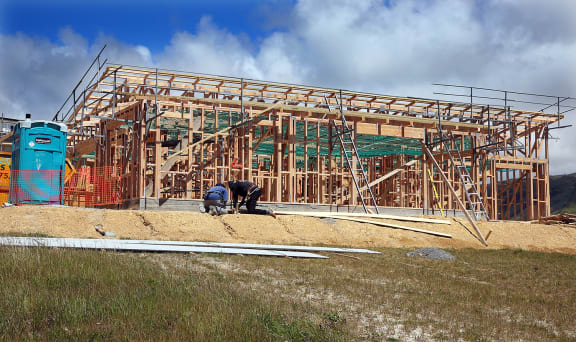Building suppliers are dismissing the Government's proposals to lower the cost of building materials, saying it is not the main problem behind unaffordable housing.
The Government has promised to shake up the industry and increase competition through a raft of measures including simplifying compliance, reducing import tariffs and ensuring greater transparency.

The Government is calling for feedback on options for cutting building material costs. Photo: RNZ
A study earlier this year by the Productivity Commission found that home building materials in New Zealand were as much as 30% more expensive than in Australia.
Housing Minister Nick Smith says he is worried that high duties on some imported building products, combined with limited competition in New Zealand, are creating excessive profit margins for building product manufacturers.
Dr Smith and Commerce Minister Craig Foss are calling for feedback on an options paper released on Wednesday which includes recommendations which could help to reduce building material costs.
Dr Smith says says the industry needs a shake-up to ensure more fairly priced homes, and one measure he's considering is reducing tariffs on imported products.
"We've only got, for instance, in the plasterboard area one manufacturer. If we have high import tariffs, then it really gives the opportunity for that manufacturer to be able to effectively price up to the tariff. That is why one of the options in this paper is to remove those or provide a concession on those tariffs for building materials."
Dr Smith also wants builders to disclose to consumers any kickbacks they receive for using particular materials.
Registered Master Builders chief executive Warwick Quinn says getting such incentives is not dissimilar to a loyalty programme - and there's nothing wrong with that.
"I'm not clear on how they intend to disclose that simply because when one purchases materials the loyalty regime is not allocated to a particular property. It's basically on a volume arrangement so it's very hard to link that directly back to a particular product for a particular house."
The building industry federation represents 140 companies. Chief executive Bruce Kohn says materials are reasonably priced and the industry is competitive.
"If you look at advertising on television, for example, you will find many advertisements which say if you can buy it at a cheaper price elsewhere, we will match it. Now that sort of competition is common in the industry."
Mr Kohn says the Government needs to address land development costs if it wants to have any effect on housing affordability.
Submissions on the Government's proposals close on 18 December.

